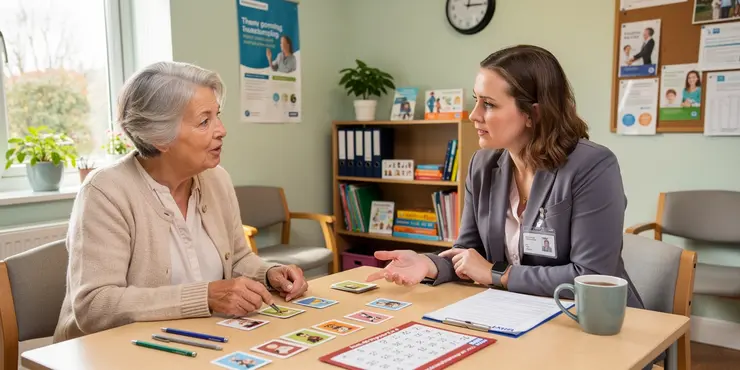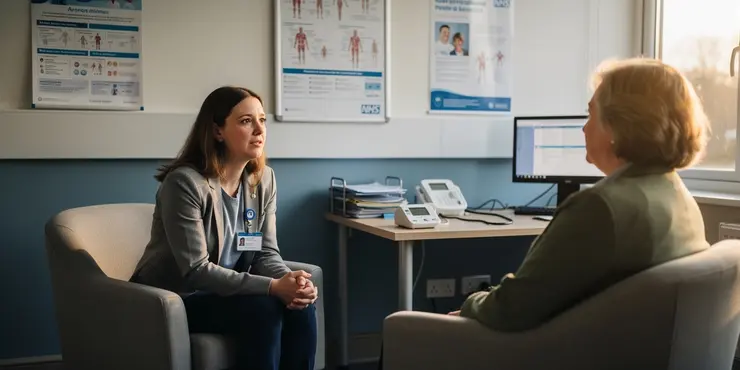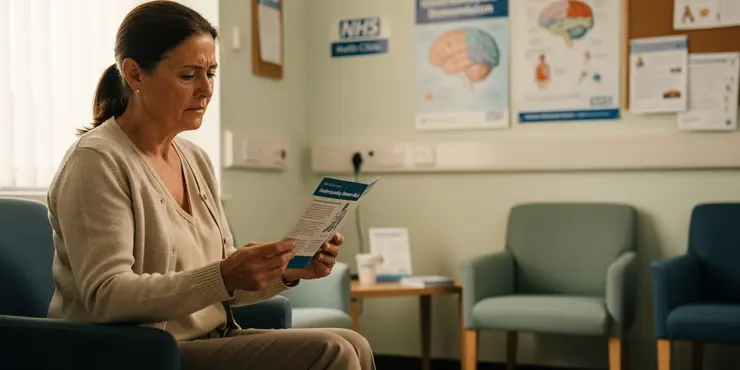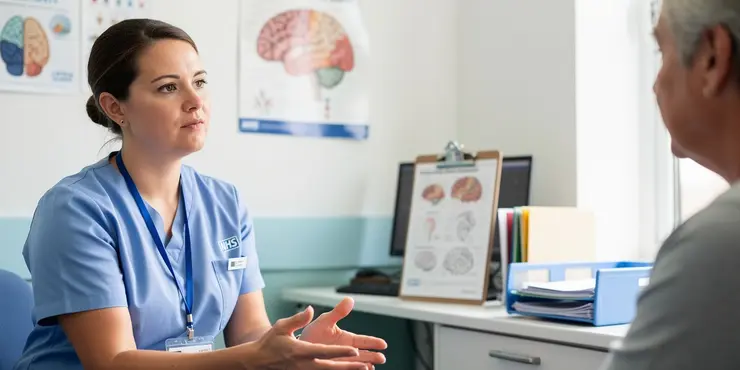
Find Help
More Items From Ergsy search
-

What are the common symptoms of dementia?
Relevance: 100%
-
What symptoms can overlap between menopause and the early stages of dementia?
Relevance: 88%
-

How common is it for women to develop dementia after menopause?
Relevance: 85%
-

What is dementia?
Relevance: 84%
-

Is there a cure for dementia?
Relevance: 80%
-

How is dementia diagnosed?
Relevance: 77%
-
What are the common symptoms of dementia?
Relevance: 76%
-
What are the common symptoms of dementia?
Relevance: 76%
-
Living with dementia | NHS
Relevance: 75%
-

Early onset dementia | NHS
Relevance: 74%
-

Can dementia affect younger people?
Relevance: 74%
-

How does dementia progress over time?
Relevance: 73%
-

What are the links between menopause and dementia?
Relevance: 71%
-

Is there scientific evidence linking menopause to dementia?
Relevance: 70%
-

Dementia by Dr Alex Kakoullis, Coventry and Warwickshire Partnership NHS Trust
Relevance: 67%
-

Can live-in care support individuals with dementia?
Relevance: 67%
-

How does menopause potentially affect dementia risk?
Relevance: 67%
-

Is the age of menopause onset related to dementia risk?
Relevance: 66%
-
Are there specific types of dementia linked to menopause?
Relevance: 66%
-

Do male and female brains age differently regarding dementia risk?
Relevance: 65%
-

What are the common symptoms of a cold?
Relevance: 64%
-
What are common symptoms of menopause?
Relevance: 64%
-

What are common symptoms of meningitis?
Relevance: 64%
-

What are the common symptoms of appendicitis?
Relevance: 64%
-

What are common symptoms of a concussion?
Relevance: 64%
-

Dementia Care at Colten Care
Relevance: 63%
-

What are the common symptoms of asthma?
Relevance: 62%
-

An introduction to frontotemporal dementia (FTD) (part 1/3)
Relevance: 62%
-

What role do carers play for those living with dementia?
Relevance: 62%
-

Can hormone replacement therapy (HRT) impact dementia risk?
Relevance: 62%
-

Do genetics play a role in dementia risk post-menopause?
Relevance: 61%
-

Are there any support groups for people with dementia in the UK?
Relevance: 61%
-

What are the common symptoms of hay fever?
Relevance: 61%
-

What are the common symptoms of Crohn's disease?
Relevance: 60%
-

What are the common symptoms of lupus in children?
Relevance: 60%
-

What further research is needed about menopause and dementia?
Relevance: 60%
-

What are common symptoms of Lyme disease?
Relevance: 59%
-
What are common symptoms of health-related anxiety?
Relevance: 59%
-

What are common symptoms of sleep apnea?
Relevance: 59%
-

What is dementia?
Relevance: 59%
Understanding the Common Symptoms of Dementia
Dementia is a term used to describe a set of symptoms that result from damage to the brain. These symptoms can vary widely, but typically affect memory, thinking skills, and the ability to perform everyday tasks. Understanding these symptoms can help in identifying and managing the condition more effectively.
Memory Loss
One of the most recognisable symptoms of dementia is memory loss, especially problems with short-term memory. Individuals may struggle to remember recent events, although they may recall events from the past. Forgetting important dates, repeatedly asking the same questions, and relying on memory aids can be early indicators of dementia.
Difficulty with Communication and Language
People with dementia often find it challenging to follow or join conversations. They may pause in the middle of a conversation and have no idea how to continue, or they may repeat themselves. Finding the right words can also become difficult, leading to frustration and a decline in social interactions.
Problems with Concentration and Decision Making
Another significant symptom is a decline in the ability to concentrate or make decisions. This can affect a person's work life and their ability to manage finances or other responsibilities. They may take longer to complete tasks and often struggle with planning or organising.
Disorientation
Disorientation is common, particularly concerning time and place. People with dementia may forget where they are, how they got there, or what time of day it is. This symptom can lead to wandering, which is a major safety concern for carers and family members.
Changes in Mood and Personality
Mood swings, changes in behaviour, and fluctuations in personality are often observed in individuals with dementia. They may become confused, suspicious, depressed, fearful, or anxious. People who were once outgoing might become withdrawn, or vice versa, leading to challenges in social interactions and relationships.
Loss of Ability to Perform Everyday Tasks
As the condition progresses, individuals with dementia may struggle with familiar tasks, such as cooking, dressing, or using household appliances. They may forget the steps involved in performing these activities or find them too mentally challenging, causing frustration and distress.
Difficulty with Visual-Spatial Abilities
People with dementia can find it difficult to judge distances and perceive depth, which affects their ability to drive or navigate stairs. This can also manifest as problems with coordination and motor skills, causing issues with activities that require fine motor skills.
Being aware of these symptoms can assist in seeking timely medical advice, enabling early intervention and better management of the condition. While these symptoms are common in dementia, they can also occur in other conditions, so it is crucial to get a proper diagnosis from a healthcare professional.
Understanding Symptoms of Dementia
Dementia is when the brain is not working well. It can make it hard to remember things, think clearly, or do daily activities. Knowing these signs can help us notice and manage dementia better.
Memory Loss
People with dementia often forget recent events, like what just happened. They might remember things from a long time ago but forget what's happening now. They may forget important dates and ask the same questions again and again. They might need reminders to help them remember.
Trouble Talking and Understanding
People with dementia might find it hard to talk or understand others. They might stop in the middle of talking and not know how to go on. They might repeat words or things they've already said. It can be tough to find the right words and this can make them upset.
Problems Focusing and Deciding
Dementia can make it hard to focus or make choices. It might affect their job or handling money. They may take longer to finish things and have a hard time planning or organizing.
Feeling Lost
People with dementia might not know where they are or what time it is. They might forget how they got somewhere or wander off. This can be scary, so it's important to keep them safe.
Mood and Personality Changes
People with dementia might feel confused, worried, sad, or scared. They might change from being friendly to being shy, or the other way around. This can make talking to other people harder.
Struggling with Daily Tasks
As dementia gets worse, people may have trouble doing everyday things like cooking or dressing. They might forget how to do these tasks or find them too hard, which can be frustrating.
Difficulty with Seeing and Moving
Dementia can make it hard to judge distances or see how deep something is. This can affect driving or going upstairs and downstairs. It can also be hard to move or do things that need careful hand movements.
Knowing these signs helps us get help from doctors early on. It’s important to talk to a doctor because other problems can also cause these signs. The doctor can give the right diagnosis and help manage the condition.
Frequently Asked Questions
Useful Links
This website offers general information and is not a substitute for professional advice.
Always seek guidance from qualified professionals.
If you have any medical concerns or need urgent help, contact a healthcare professional or emergency services immediately.
Some of this content was generated with AI assistance. We’ve done our best to keep it accurate, helpful, and human-friendly.
- Ergsy carfully checks the information in the videos we provide here.
- Videos shown by Youtube after a video has completed, have NOT been reviewed by ERGSY.
- To view, click the arrow in centre of video.
- Most of the videos you find here will have subtitles and/or closed captions available.
- You may need to turn these on, and choose your preferred language.
- Go to the video you'd like to watch.
- If closed captions (CC) are available, settings will be visible on the bottom right of the video player.
- To turn on Captions, click settings .
- To turn off Captions, click settings again.
More Items From Ergsy search
-

What are the common symptoms of dementia?
Relevance: 100%
-
What symptoms can overlap between menopause and the early stages of dementia?
Relevance: 88%
-

How common is it for women to develop dementia after menopause?
Relevance: 85%
-

What is dementia?
Relevance: 84%
-

Is there a cure for dementia?
Relevance: 80%
-

How is dementia diagnosed?
Relevance: 77%
-
What are the common symptoms of dementia?
Relevance: 76%
-
What are the common symptoms of dementia?
Relevance: 76%
-
Living with dementia | NHS
Relevance: 75%
-

Early onset dementia | NHS
Relevance: 74%
-

Can dementia affect younger people?
Relevance: 74%
-

How does dementia progress over time?
Relevance: 73%
-

What are the links between menopause and dementia?
Relevance: 71%
-

Is there scientific evidence linking menopause to dementia?
Relevance: 70%
-

Dementia by Dr Alex Kakoullis, Coventry and Warwickshire Partnership NHS Trust
Relevance: 67%
-

Can live-in care support individuals with dementia?
Relevance: 67%
-

How does menopause potentially affect dementia risk?
Relevance: 67%
-

Is the age of menopause onset related to dementia risk?
Relevance: 66%
-
Are there specific types of dementia linked to menopause?
Relevance: 66%
-

Do male and female brains age differently regarding dementia risk?
Relevance: 65%
-

What are the common symptoms of a cold?
Relevance: 64%
-
What are common symptoms of menopause?
Relevance: 64%
-

What are common symptoms of meningitis?
Relevance: 64%
-

What are the common symptoms of appendicitis?
Relevance: 64%
-

What are common symptoms of a concussion?
Relevance: 64%
-

Dementia Care at Colten Care
Relevance: 63%
-

What are the common symptoms of asthma?
Relevance: 62%
-

An introduction to frontotemporal dementia (FTD) (part 1/3)
Relevance: 62%
-

What role do carers play for those living with dementia?
Relevance: 62%
-

Can hormone replacement therapy (HRT) impact dementia risk?
Relevance: 62%
-

Do genetics play a role in dementia risk post-menopause?
Relevance: 61%
-

Are there any support groups for people with dementia in the UK?
Relevance: 61%
-

What are the common symptoms of hay fever?
Relevance: 61%
-

What are the common symptoms of Crohn's disease?
Relevance: 60%
-

What are the common symptoms of lupus in children?
Relevance: 60%
-

What further research is needed about menopause and dementia?
Relevance: 60%
-

What are common symptoms of Lyme disease?
Relevance: 59%
-
What are common symptoms of health-related anxiety?
Relevance: 59%
-

What are common symptoms of sleep apnea?
Relevance: 59%
-

What is dementia?
Relevance: 59%


